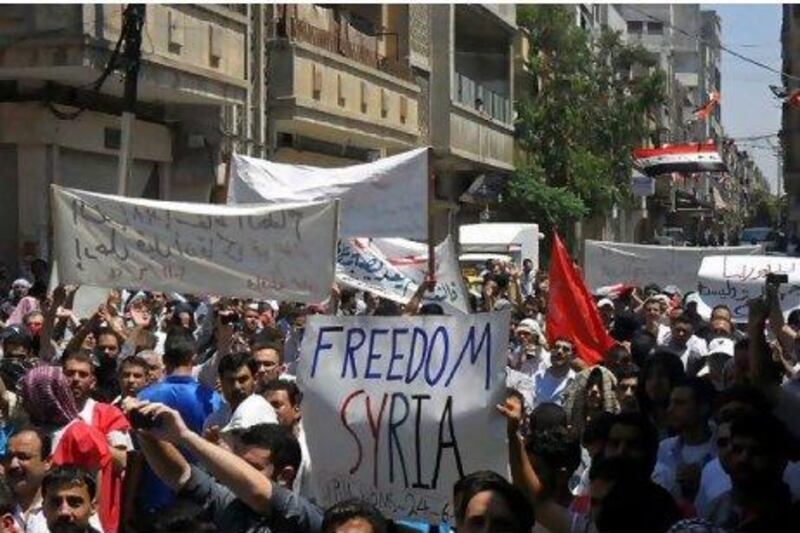DAMASCUS // At least 12 protesters were killed by security forces in mass protests across Syria yesterday as violence continued to overshadow efforts to defuse the crisis with promises of political reform.
On Monday, Syria's president, Bashar Al Assad, offered to rewrite the constitution to permit the formation of opposition political parties by the end of the year.
Video: Further killings by security forces reported in Syria
Last Updated: June 25, 2011 UAE
Witnesses and activists say Syrian security forces shoot dead more than a dozen people after thousands of protesters took to the streets.
Senior officials stressed that this meant Syria was on the path to "democracy" and suggested the rule of the Baath party was coming to an end.
However, yesterday's widespread protests - including renewed calls for a regime change - were how demonstrators responded to that offer. Dissidents said the use of deadly force by security units at protests in Damascus, Hama, Homs, Kseer and Kisweh proved that assurances about reform were hollow.
"Actions speak louder than words," said one pro-democracy dissident on condition of anonymity.
"The authorities talk about democracy and dialogue but at the same time they are arresting and shooting people who are calling for those exact same things."
The European Union yesterday announced economic sanctions and travel bans targeting security officials, businessmen and companies closely associated with the regime. Sanctions were also imposed by the EU on three senior Iranian military officers, who Brussels accused of helping to violently suppress demonstrators in Syria.
Authorities say they have addressed the legitimate demands of protesters by ending martial law and freeing certain political prisoners.
They claim deeper reforms will follow by September.
As a result of these measures, Mr Al Assad has said there was no need for continued protests.
But activists are adamant about taking their demands to the streets. Protest leaders believe the authorities will only be swayed by the pressure of public demonstrations.
Despite the government's pledges of change, security forces continue to act with impunity, killing protesters and arresting and abusing prisoners, according to rights groups.
"The protests must carry on. They are the only reason the authorities are talking about reform at all," said one dissident. "If protests stop now, all will be lost, they must keep on going. There is no such thing as a partial victory. They must continue until there is a democracy in place. At the moment we have no concrete political change to show for the uprising," he said.
State media denied activists' claims that security forces were responsible for yesterday's killings. Government controlled news agencies blamed the "armed gangs" they said have been trying to spread chaos throughout the country as part of a foreign-backed plot.
Syrian television said one police officer was killed in Qadam, a sprawling working-class suburb on the southern edge of the capital that has seen persistent demonstrations.
Protests in other parts of the capital were also deadly. Four protesters were fatally shot in Barzeh, according to activists. Barzeh has seen numerous protests and deaths since the uprising began more than 100 days ago.
Since then, more than 1,400 civilians have been killed, according to human rights monitors, and some 10,000 dissidents jailed. The government says more than 400 security personnel have lost their lives during the same period.
Activists said at least three demonstrators were fatally shot in Kisweh, south of Damascus, home to a large military base. Some dissidents claimed defecting army units there had clashed with loyalist security forces, an allegation the government denied.
A 12-year-old boy was shot dead in the central city of Homs, activists said, adding to the scores of children already killed.
Analysts say there is now a stalemate between the protesters and the authorities, with neither side able to bring decisive pressure against their opponent.
There is a growing sense of urgency among officials, analysts said, and the possibility of economic collapse. Mr Al Assad underlined the "danger" posed by economic failure in his Monday address.
"The regime has to try to deal with this quickly, it has a matter of months before the economy becomes a major, perhaps deceasing factor in this," said one independent analyst. "They want to end the protests before the money dries up."
Speculation has begun to circulate in Damascus that, in a matter of months, the government will not have enough money to pay salaries.
Even economists who believe the government likely has enough reserve cash to prevent that shortfall say the speculation points to rapidly diminishing confidence in the authorities.
Syrians in the north continued to flee violence yesterday, with refugees seeking safety in neighbouring Turkey. There are some 11,000 Syrians now sheltered there, according to aid agencies.
Syrian officials said military units were continuing operations in the border area and had encountered no resistance. Army units have been sweeping through northern districts after the government apparently lost control of the large border town of
Jisr al Shughour. The government says armed terrorist groups killed scores of security personnel there and buried them in mass graves.
Opposition activists say the deaths occurred when army units refused orders to open fire on unarmed civilian protesters and, instead, fought to defend them against advancing security units.





